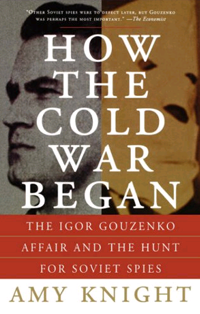How the Cold War Began
“Amy Knight is one of the most meticulous and ground-breaking scholars of Soviet history, and this latest work is her best yet…a gripping spy thriller, a fascinating human story, and a magisterial history of how the victors of WWII moved from four years of Grand Alliance to forty years of Cold War.”
Simon Sebag Montefiore
 On September 5, 1945, Soviet cipher clerk Igor Gouzenko severed ties with his embassy in Ottawa, Canada, reporting allegations to authorities of a Soviet espionage network in North America. His defection sent shockwaves through Washington, London, and Ottawa. In her riveting narrative, Amy Knight documents how Gouzenko’s defection, and the events that followed it, triggered Cold War fears and altered the course of modern history. Knight sheds new light on the Gouzenko Affair, showing how J. Edgar Hoover hoped to discredit the Truman administration by incriminating U.S. government insiders Alger Hiss and Harry Dexter White. She also probes Gouzenko’s motives for defecting and brilliantly connects these events to the strained relations between the Soviet Union and the West that marked the beginning of the Cold War. On September 5, 1945, Soviet cipher clerk Igor Gouzenko severed ties with his embassy in Ottawa, Canada, reporting allegations to authorities of a Soviet espionage network in North America. His defection sent shockwaves through Washington, London, and Ottawa. In her riveting narrative, Amy Knight documents how Gouzenko’s defection, and the events that followed it, triggered Cold War fears and altered the course of modern history. Knight sheds new light on the Gouzenko Affair, showing how J. Edgar Hoover hoped to discredit the Truman administration by incriminating U.S. government insiders Alger Hiss and Harry Dexter White. She also probes Gouzenko’s motives for defecting and brilliantly connects these events to the strained relations between the Soviet Union and the West that marked the beginning of the Cold War.
 
|